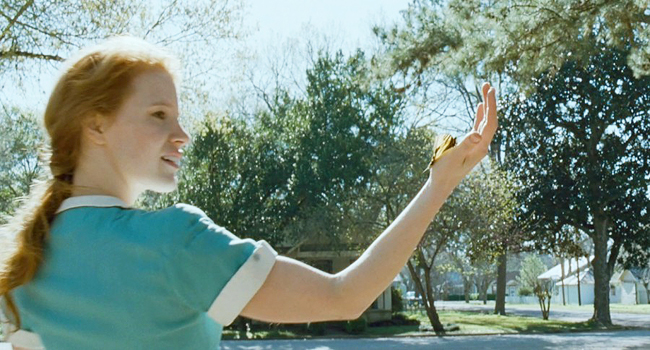 |
| Brad Pitt as Mr. O'Brien with his first son Jack |
It's a snapshot of the O'Brien family at a particular time in its history - mother, father and three boys - living in a Texan suburb (a passing truck says Waco on its side). It starts with a death and ends with a reconciliation with God about that death. It is the mid 1960s and Mrs. O'Brien (Jessica Chastain) has received a telegram informing her of the death of their middle son at age nineteen. Mr. O'Brien (Brad Pitt) receives a call at his place of work. They do not disclose why or how the boy died. Perhaps that doesn't matter but the uncertainty lends an additional sense of melancholy and loss to the remainder of the film. Neither father or mother are given first names - is it because they are archetypes representing the authority of all parents? Is it because neither the boys or the viewer see them as individuals apart from their role in the family?
The mother is the symbol of the source of life - perhaps that is why we begin with her reaction to the boy's death and then the director Malick inserts a series of beautiful scenes that appear to be about the beginnings of the earth's formation that I interpret as analogous to the beginnings of life and the birth of all three sons. The scenes reminded me, superficially, of certain Kubrick films, because they were so dreamy and obscure.
If you ask why dinosaurs are introduced into a later sequence I can give you no credible answer because I honestly
don't know. There is an element of violence with one creature attacking the other - is that the cruelty of nature represented by the father figure one wonders? Many of these scenes, while beautiful, could have been used, I believe, more sparingly.
The scene changes to the present day where Jack O'Brien (Sean Penn), the moody eldest son who has become an architect, begins to think back on his life as a teenager during the 1950s growing up with his brothers.
The young Jack (Hunter McCracken) is raised by two vastly different parents: Mrs. O'Brien is gentle, lovely, self-effacing, loving and playful. Mr. O'Brien is authoritarian, emotionally volatile and sometimes violent with the boys. A frustrated musician who loves classical music, he attempts to control the natural unruliness of the three boys with strict discipline and wordy exhortations on how to live right. Mrs. O'Brien is often seen as a passive observer who permits her husband free reign (something the young Jack calls her on eventually) even though she is genuinely distressed by his aggressive and harsh behavior towards the boys.
 |
| Chastain as Mrs. O'Brien lends a magical presence to the boys' lives |
Eventually the plant where Mr. O'Brien works as an engineer closes and he is forced to transfer to a new location or accept a less challenging position. The family mournfully packs up and moves. The following vivid scene ensues: there is a visualization of the planet Earth being destroyed, incinerated by the sun, that I think we can infer is meant to symbolize the destruction of the life that the family has come to know in their beautiful house in Waco.
In the present day, Jack is transported to a sort of fantasy landscape - a rocky terrain that soon becomes a beach (echoes of the films of Federico Fellini here) populated by people from Jack's past. As in a Fellini film, they drift past him with no specific purpose, sometimes embracing or touching but not speaking. But there is a resolution of sorts, Mrs. O'Brien appears to be giving up her middle son to God in a lovely, elaborate ritual where she holds her hands up to the sky and chants.
As I said, I think the film did not need these atmospheric shots about the beginning and the end of the world. They are visually stunning but, I don't think, are always necessary and what these scenes did accomplish was sometimes to drive away otherwise interested film goers who were puzzled by their meaning.
 |
| The dreamy final scene reminiscent of Fellini's films |









No comments:
Post a Comment